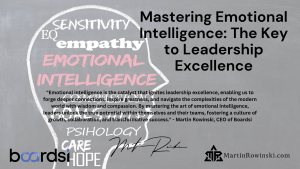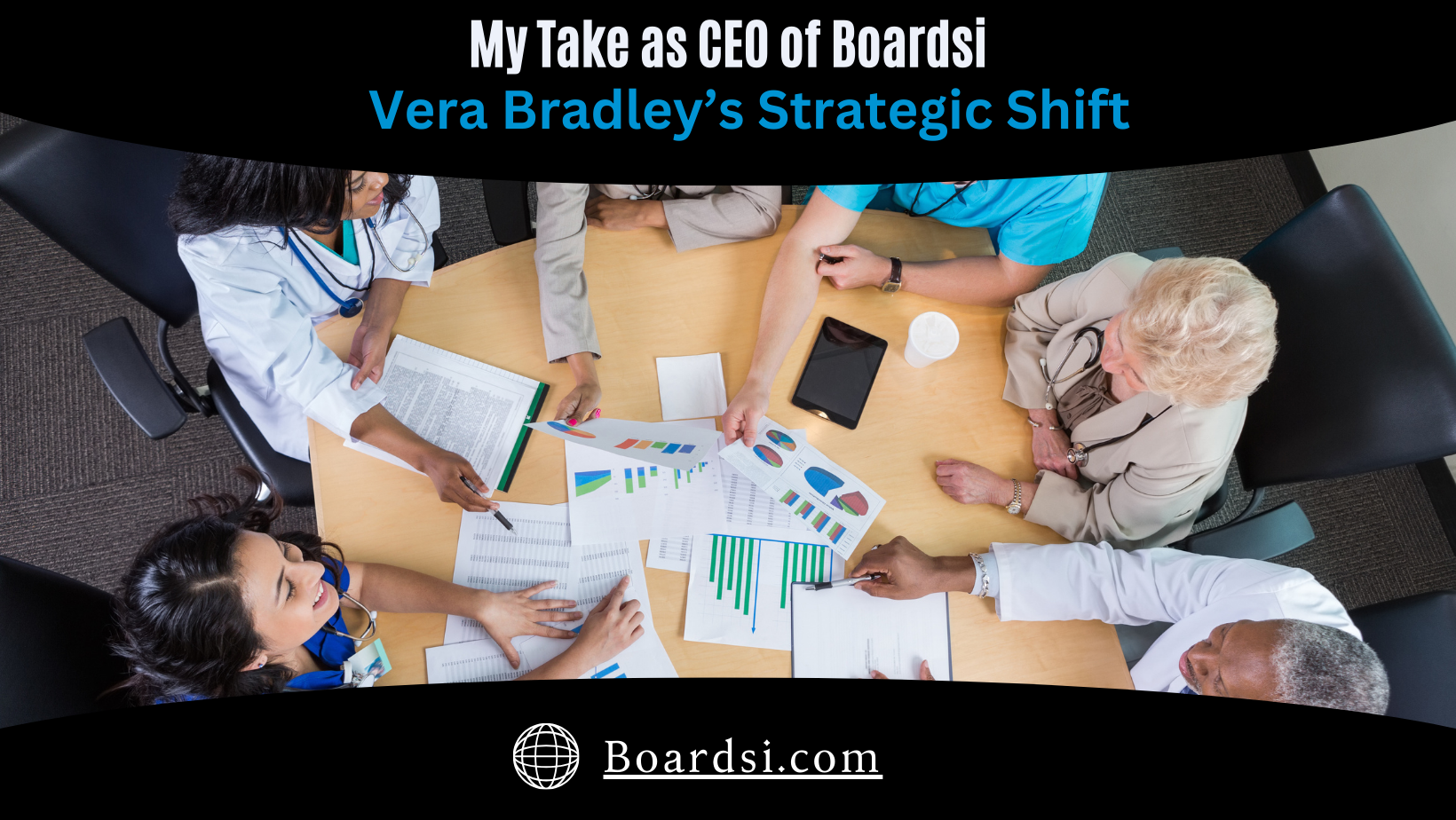The Core of Emotional Intelligence:
Emotional intelligence encompasses recognizing, comprehending, managing, and effectively employing emotions in oneself and others. It comprises self-awareness, self-regulation, empathy, and social skills. Leaders with high emotional intelligence foster a positive work atmosphere, cultivate trust, and make informed decisions considering the impact on individuals and teams.
“Emotional intelligence serves as the catalyst igniting leadership excellence, enabling us to forge deeper connections, inspire greatness, and navigate the complexities of the modern world with wisdom and compassion. By mastering the art of emotional intelligence, leaders unlock the true potential within themselves and their teams, nurturing a culture of growth, collaboration, and transformative success.” – Martin Rowinski, CEO of Boardsi
Cultivating Self-Awareness:
Self-awareness forms the bedrock of emotional intelligence. Leaders must invest time in introspection and reflection to comprehend their emotions, strengths, limitations, and triggers. Practices such as mindfulness, journaling, or seeking feedback from trusted peers or coaches aid in self-awareness development.
Enhancing self-awareness is a pivotal step in developing emotional intelligence and becoming an effective leader. It involves gaining a profound understanding of one’s emotions, strengths, limitations, and triggers. By honing self-awareness, leaders can navigate their emotions and interactions with others more adeptly.
To nurture self-awareness, leaders can engage in various practices. Mindfulness, a potent technique, helps individuals observe their thoughts, emotions, and bodily sensations without judgment. Through mindfulness, leaders develop a heightened sense of self-awareness and discern patterns in their emotional responses.
Journaling serves as another valuable tool for self-reflection. By routinely recording thoughts and experiences, leaders gain insights into their emotions and behaviors, identifying patterns, tracking progress, and pinpointing areas for growth.
Seeking feedback from trusted peers or coaches is also beneficial. Others may offer valuable insights and observations that leaders might not readily recognize in themselves. Constructive feedback offers an external perspective aiding leaders to grasp their impact on others and their emotional dynamics.
“Self-awareness is the compass guiding leaders on their growth journey, illuminating the path to authentic leadership and fostering meaningful connections with others.” – Martin Rowinski, CEO of Boardsi
For instance, a leader might notice a tendency to become easily frustrated when confronting unexpected challenges. Through self-awareness practices, they recognize this emotional trigger and its impact on decision-making and interactions. Armed with this awareness, the leader can consciously work on managing frustration and adopting a composed, constructive response.
By fostering self-awareness, leaders attune themselves to emotions, strengths, and limitations. This heightened awareness enables effective emotion regulation, intentional decision-making, and adaptability in leadership styles. Ultimately, self-awareness lays the groundwork for other vital components of emotional intelligence, nurturing authentic and impactful leadership.
Cultivating Self-Regulation:
Self-regulation involves managing emotions and impulses aligning with organizational goals and values. Leaders practice emotional resilience, effective stress management, and maintaining composure in challenging situations. Pausing before responding, deep breathing, or seeking support are valuable self-regulation strategies.
“Self-regulation serves as the master key empowering leaders to unlock their true potential, enabling them to navigate storms with composure, make wise decisions, and inspire their teams with unwavering resolve.” – Martin Rowinski, CEO of Boardsi
Cultivating self-regulation is crucial for effectively managing emotions and impulses. It entails regulating and controlling emotional reactions in a way that aligns with organizational goals and values.
To develop self-regulation, leaders employ practices that promote emotional resilience and composure. Strategies include bouncing back from setbacks, reframing negative situations, focusing on solutions, and maintaining a positive outlook.
Managing stress effectively is critical. Techniques such as task prioritization, time management, and engaging in relaxing activities help leaders avoid overwhelm and maintain clarity in decision-making.
Maintaining composure in challenging situations is another aspect of self-regulation. Taking a moment to gather thoughts enables leaders to respond thoughtfully instead of reacting impulsively.
Deep breathing exercises aid in emotion regulation. Intentional breaths activate the body’s relaxation response, reducing stress and fostering a sense of calm.
Seeking support is beneficial. Trusted mentors, coaches, or colleagues offer guidance during challenging times, providing fresh perspectives.
For example, when faced with critical feedback in a high-pressure meeting, a leader with strong self-regulation skills would pause, practice deep breathing to calm nerves, and objectively consider the feedback. This deliberate approach allows for a thoughtful response, constructive addressal of concerns, and maintained composure.
By cultivating self-regulation, leaders manage emotions effectively, make value-aligned decisions, and navigate challenges calmly. This skill enables thoughtful responses, fostering a positive work environment and building trust among team members.
Empathy: The Bridge to Connection:
Empathy, understanding and sharing others’ feelings, connects leaders and their teams deeply. Actively listening, seeking diverse perspectives, and genuinely caring are essential empathy-building practices. Engaging in empathy exercises and fostering an empathetic organizational culture strengthens this skill.
“Empathy bridges the gap between leaders and their teams, fostering a profound understanding that transcends words. It is through genuine empathy that leaders create a tapestry of trust, compassion, and unity, empowering individuals and propelling organizations towards greatness.” – Martin Rowinski, CEO of Boardsi
Empathy serves as a potent bridge linking leaders and team members on a deeper level. It involves understanding and sharing others’ feelings and perspectives. By nurturing empathy, leaders build trust, promote collaboration, and create an environment where individuals feel heard and valued.
Active listening forms the bedrock of empathy. Leaders who actively listen offer undivided attention, suspend judgment, and create a safe space for expression. They seek to comprehend emotions and concerns, fostering trust and safety.
Seeking diverse perspectives is vital. Leaders encouraging diverse viewpoints and valuing different experiences create inclusivity. Understanding diverse perspectives aids in making informed decisions and crafting solutions suitable for a diverse workforce.
Genuine care and compassion are at the heart of empathy. Leaders expressing empathy acknowledge and validate team members’ emotions, offering understanding and support, fostering belongingness, and encouraging open sharing.
Empathy exercises aid in enhancing empathetic abilities. These exercises involve stepping into others’ shoes, imagining experiences, and reflecting on potential emotions. They foster understanding of actions’ impact and habitualize empathetic responses.
To bolster empathy within the organization, leaders foster an empathetic culture. Encouraging open communication, celebrating diversity, and appreciating unique contributions cultivate empathy as a natural part of interactions.
For instance, a team member expressing frustration due to personal challenges missing a deadline would find an empathetic leader actively listening, acknowledging emotions, and understanding underlying reasons. The leader might offer support or adjust deadlines, fostering understanding, trust, and collaboration.
Through empathy, leaders forge connections, build trust, and enhance collaboration. Empathy creates an environment valuing individuals’ experiences, fostering open communication, and ultimately leading to a more cohesive and successful team.
Enhancing Social Skills:
Leaders excelling in communication, influence, and conflict resolution possess strong social skills.









